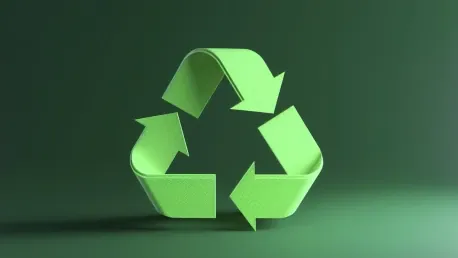In a significant push to enhance environmental sustainability, Michigan has experienced a notable increase in its recycling rate, which has climbed from roughly 14% before 2019 to over 23% today. This upward trend signals the state’s commitment to recycling initiatives, aligning its goals with national efforts. The Michigan Department of Environment, Great Lakes, and Energy (EGLE) has set an ambitious target, aiming to achieve a 30% recycling rate by 2029. Meanwhile, the national recycling rate currently stands at 32%, with the U.S. Environmental Protection Agency (EPA) striving for a 50% rate by 2030. These statistics reflect broader efforts to improve waste management and environmental stewardship across the country.
To further accelerate recycling programs, Michigan has allocated over $5 million in new grants to various counties, including Metro Detroit, Genesee County, and Marquette County. These funds are intended to support a range of initiatives aimed at expanding recycling infrastructure and accessibility. By focusing on both urban and rural areas, the state aims to address disparities in recycling capabilities and ensure that more residents can participate in sustainable waste management practices. The concerted effort highlights Michigan’s dedication to achieving long-term environmental goals and contributing to national recycling targets.
Targeted Investments in Genesee and Marquette Counties
One of the most notable beneficiaries of the recent grants is Genesee County, which will receive $900,000 to establish its first countywide recycling drop-off center. This facility is anticipated to open by 2027 and will significantly impact the community, particularly for residents who live in apartment complexes and mobile homes where curbside recycling services are often unavailable. The establishment of this center will create opportunities for more residents to recycle their household waste and contribute to the county’s overall recycling efforts. This initiative represents a crucial step in expanding recycling access across Genesee County, promoting environmental consciousness and sustainable waste management practices.
Similarly, Marquette County is set to receive $900,000 to enhance its materials recovery facility, which currently processes about 8,500 tons of recyclables annually. The additional funding will be used to expand the facility’s floor space, accommodating increased quantities of recyclable material and addressing the region’s low recycling rates. By upgrading the materials recovery facility, Marquette County aims to improve the efficiency and capacity of its recycling operations, providing better service to residents and encouraging greater participation in recycling programs. This initiative underscores the importance of investing in infrastructure to support and sustain increased recycling efforts.
Infrastructure Upgrades Across Multiple Counties
Beyond Genesee and Marquette, several other counties have been awarded grants to improve their recycling infrastructure. Isabella County, for example, will use its funds to upgrade an existing materials recovery facility to single-stream processing. This modification will simplify the recycling process, making it easier for residents to recycle a wider variety of materials without the need for separation. Single-stream processing is a proven method to boost recycling rates by reducing the effort required from participants, and Isabella County’s upgrade is expected to yield a positive impact on local recycling efforts.
Sterling Heights is another beneficiary, transitioning to universal curbside recycling. With the introduction of curbside services, residents will have direct and convenient access to recycling, thereby increasing participation rates. The transition to curbside recycling in Sterling Heights is a significant development, aimed at making recycling an integral part of daily life for residents. The ease and convenience of curbside collection are anticipated to drive higher recycling volumes, contributing to the city’s sustainability goals.
Expanding Access and Resources for Recycling
In addition to the aforementioned counties, Van Buren County will use its allocated funds to make infrastructure upgrades at eight transfer stations. These enhancements are crucial for streamlining the collection and processing of recyclable materials, ensuring that the county can handle increased volumes efficiently. The upgrades will support Van Buren County’s broader efforts to improve recycling rates and environmental sustainability, reflecting Michigan’s comprehensive strategy to enhance waste management practices across the state.
Moreover, Madison Heights will implement a community-wide recycling and trash cart program as part of its grant-funded initiative. Lansing, the state capital, plans to invest in a new recycling truck and recycling containers, further bolstering the city’s collection capabilities. Such investments are essential for maintaining and expanding recycling services, ensuring that residents have the necessary tools and infrastructure to participate effectively in sustainable waste management practices. These initiatives highlight the diverse approaches being taken across Michigan to foster a culture of recycling and environmental responsibility.
Southwest Oakland County will also benefit from the funding, with plans to use the money for robotic sorting equipment. This advanced technology represents a significant leap forward in improving the efficiency and accuracy of sorting recyclable materials. The introduction of robotic sorting equipment will enhance the county’s ability to process recyclables quickly and effectively, reducing contamination rates and improving the overall quality of recyclable output. The adoption of innovative technologies is a key aspect of Michigan’s approach to modernizing its recycling infrastructure.
A Comprehensive Roadmap to Higher Recycling Rates
In a significant push to enhance environmental sustainability, Michigan has seen a notable boost in its recycling rate, climbing from about 14% before 2019 to over 23% today. This upward trend demonstrates the state’s commitment to recycling, aligning its efforts with national goals. The Michigan Department of Environment, Great Lakes, and Energy (EGLE) has set an ambitious target of reaching a 30% recycling rate by 2029. Currently, the national recycling rate stands at 32%, with the U.S. Environmental Protection Agency (EPA) aiming for a 50% rate by 2030. These figures reflect wider efforts in America to enhance waste management and promote environmental stewardship.
To further boost recycling programs, Michigan has allocated over $5 million in new grants to various counties, including Metro Detroit, Genesee, and Marquette. These funds are designed to support initiatives that expand recycling infrastructure and accessibility. By targeting both urban and rural areas, the state addresses disparities in recycling capabilities, ensuring more residents participate in sustainable waste management. This concerted effort underscores Michigan’s dedication to long-term environmental goals and its contribution to national recycling targets.









